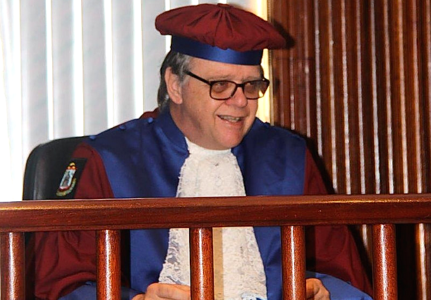
PHILIPSBURG–The Constitutional Court of St. Maarten on Thursday morning has referred the entire Integrity Chamber Ordinance to the garbage bin. The judgment was rendered by President of the Constitutional Court Jacob “Bob” Wit.
Ombudsman Nilda Arduin had requested the Court to review the constitutionality of the Ordinance.
The judgment was rendered by the three-judge panel, which besides Wit, consists of Judges Jan de Boer and Ben Vermeulen.
The most far-reaching complaint the Ombudsman had brought forward in a petition to the Court, which was filed in September 2015, was that the Advisory Council had not been consulted about a substantial amendment to the law, which had been introduced by Government during the parliamentary debates on the subject.
The Court found this complaint to be justified, as the amendment introduced substantial changes, both to the initial draft legislation and to the law that was eventually introduced in Parliament.
The Court considered that in the course of the legislative process the balance between effectiveness, legal protection and supervision in the “legal framework of this law had fundamentally changed to such an extent that it would have been…upon the government to formally consult the Advisory Council.”
This, the Court stated, is particularly so as the law seeks to create an entirely new institution, which cannot be compared to “anything remotely similar” within the Kingdom of the Netherlands.
The Constitution gives the Constitutional Court the power to “strike down” a law on the basis of it being incompatible with the Constitution, either in substance or in form.
The Court stated it was “fully aware” of the fact that nullification of the Ordinance may be considered a “harsh” measure, “given the importance and the goal and purpose of the legislation, which with good reason seeks to achieve an appropriate approach of law enforcement against integrity breaches within and around the institutions of St. Maarten’s governmental structure,” Judge Wit explained to those present at the Courthouse on Thursday morning.
Notwithstanding that, the Court deemed nullification of the Ordinance in this case necessary. In making this decision, the three-Judge panel took into account what it described as the “many substantive, and, from a constitutional perspective, essential flaws and serious ambiguities” in the Ordinance.
The Court pointed at elements of the Ordinance that are unclear and, in providing guidance, made several suggestions with respect to the constitutional safeguards that need to be observed when drafting a new Ordinance. These mainly concern the constitutional right to privacy and the right to a fair trial.
During the Court hearing of this case, held January 22, the Ombudsman had filed several legal objections to the Ordinance.
In drafting legislation, the Court stated, it should be considered and clarified to what extent the Integrity Chamber’s authority to hear persons under oath or “on pain” of a fine should be maintained, particularly with respect to the primary subject of an investigation.
The Court further ruled that these “privileges” of the Chamber should be excluded as soon as that person is under a criminal charge.
Moreover, the Court found that statements thus acquired by the Integrity Chamber in an administrative investigation should be prohibited from being used as evidence in a criminal trial, as this would be in violation of the right against self-incrimination.
A new Ordinance should also be clear on what kind of information gathered by the Integrity Chamber during its investigations should be handed over to the Prosecutor’s Office, and to what extent the Chamber, after the subject of its investigations had been charged with a crime, could still continue its own investigation.
“A coordination of regulations between the Integrity Chamber and the Prosecution Service appears indispensable,” the Court said.
Another issue the Court explored were the powers of the Integrity Chamber with regard to searches and investigations on a suspect’s premises, which would require oversight and supervision by an institution with “sufficient safeguards for independence and expertise.”
This, together with a complaint procedure comparable to criminal procedure should secure compatibility with the constitutional right to protection of privacy.
The Court stressed, however, that the Commission of Supervision as created by the current Ordinance could not serve as such an institution as its independence and expertise are not guaranteed by this law and it does not have the necessary powers to properly fulfil that role.
“More generally, the supervising body of the Integrity Chamber would need sufficient powers with respect to that Chamber,” the Court concluded.
After the January hearing, the Constitutional Court tentatively scheduled a decision for March 31, but the presentation of the verdict was delayed several times.
Bron: The Daily Herald


Eerlijk deze Bob Wit vertrouw ik voor geen halve meter, ken hem van het cafe terras, keukenpleintje